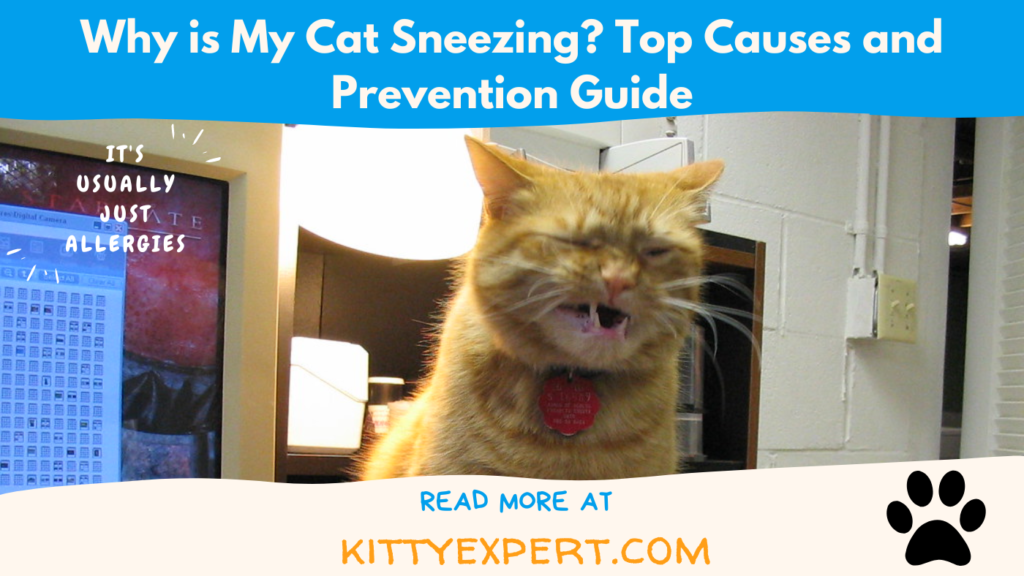Hey there, fellow cat parent! If you’re here, it’s probably because you’re worried about your furry feline friend. Sneezing in cats can be pretty common, but it’s always good to know the reasons why it’s happening and how to prevent it. So, let’s dive into the top reasons leading to the question, “Why is my cat sneezing?”
1. Allergies
Just like us humans, cats can also suffer from allergies. They can be allergic to anything from pollen to mold, dust mites, or even certain types of food. Allergies can cause sneezing, itchiness, and watery eyes in cats.
2. Upper Respiratory Infection (URI)
URI is a common reason why cats sneeze. It’s a contagious disease that can be caused by viruses or bacteria. Common URI symptoms include sneezing, runny nose, fever, and coughing.
3. Foreign objects
If your cat has been playing with small toys or exploring outside, they may have accidentally inhaled a foreign object into their nostrils. This can cause irritation and make them sneeze.
4. Dental problems
Cats with dental issues can also sneeze. If they have a dental infection, it can spread to their nasal cavity and cause sneezing.
5. Chemical irritants
If you’ve recently used cleaning products or air fresheners, the strong scents can irritate your cat’s nasal passage, causing them to sneeze.
6. Feline Viral Rhinotracheitis (FVR)
FVR is a highly contagious viral infection that affects cats. It can cause sneezing, nasal discharge, and even ulceration of the eyes.
7. Calicivirus
Calicivirus is another viral infection that can cause sneezing, fever, and mouth ulcers in cats. It’s highly contagious and can spread quickly between cats.
8. Chlamydophila Felis
This bacterial infection can cause conjunctivitis, sneezing, and nasal discharge in cats. It’s often spread between cats in close proximity to each other.
9. Cancer
In rare cases, nasal cancer can cause sneezing in cats. This is more common in older cats. Still, it’s highly recommended that you look into pet insurance for cats and get a suitable plan that fits your budget.
10. Stress
Believe it or not, stress can also cause cats to sneeze. Cats that are stressed or anxious may develop respiratory issues, including sneezing.
How to prevent your cat form sneezing?
While sneezing in cats is generally not a cause for concern, it can be a sign of an underlying health issue that needs to be addressed. Therefore, it’s essential to take preventive measures to keep your cat from sneezing. Here are some tips in that regard that you can look into:
Keep Your Home Clean
One of the most common causes of cat sneezing is dust, pollen, and other allergens present in the air. Keeping your home clean is essential to prevent your cat from inhaling these irritants. Make sure you vacuum regularly and change the air filters in your home’s heating and cooling systems frequently. Dusting your home regularly can also help reduce the amount of dust present in your home.
Use a High-Quality Cat Litter
If you’re using a low-quality cat litter, it could be causing your cat to sneeze. Remember, certain cats such as bengal cats are selective about their products and in that case, you would need to get appropriate cat litter for bengals.
Low-quality cat litter can produce dust that can irritate your cat’s respiratory system. Switching to a high-quality, dust-free litter can help reduce the amount of dust in the air, thereby preventing your cat from sneezing.
Keep Your Cat Away from Cigarette Smoke
Cigarette smoke is harmful to cats and can cause them to sneeze. Make sure that you don’t smoke around your cat, and if you’re a smoker, consider quitting. If you have guests who smoke, ask them to smoke outside to avoid exposing your cat to second-hand smoke.
Avoid Strong Chemicals and Scents
Strong scents from cleaning products, air fresheners, and perfumes can irritate your cat’s respiratory system and cause them to sneeze. Try to use natural cleaning products instead of harsh chemicals, and avoid using air fresheners or perfumes around your cat.
Regular Vet Check-ups
Regular visits to the vet can help detect any underlying health issues that may be causing your cat to sneeze. Your vet can perform a physical exam and recommend tests to diagnose any health issues early on.
As mentioned earlier, cats can suffer from certain health conditions such as feline viral rhinotracheitis, calicivirus, and chlamydophila felis. Correct and early diagnosis of such conditions can ensure that your furry friend gets appropriate treatment on time and gets relief from sneezing.
Proper Nutrition
Feeding your cat a well-balanced and nutritious diet can help keep their immune system healthy, reducing the chances of them getting sick and sneezing. Make sure that you’re feeding your cat high-quality food that meets their nutritional needs.
Maintain Good Dental Health
Poor dental health can lead to bacterial infections, which can cause your cat to sneeze. Make sure to brush your cat’s teeth regularly and schedule regular dental check-ups with your vet.
Keep Your Cat Vaccinated
Vaccinations are crucial in preventing your cat from getting sick and sneezing. Regular vaccinations protect your cat from infectious diseases that can cause respiratory issues. Make sure that your cat is up-to-date on all their vaccinations.
Monitor Your Cat’s Behavior
Cats are experts at hiding any signs of illness, so it’s important to monitor your cat’s behavior for any changes. If your cat is sneezing frequently or showing other signs of illness, such as lethargy, loss of appetite, or discharge from their nose or eyes, consult your vet immediately.
Cat sneezing is usually not a cause for concern, but it’s always better to be safe than sorry. Taking preventive measures can help reduce the chances of your cat getting sick and sneezing. Keeping your home clean, using high-quality cat litter, scheduling regular vet check-ups, etc. are some of the ways to prevent your cat from sneezing. Remember that prevention is always better than cure, so take the necessary steps on your end in the interest of your cat.

